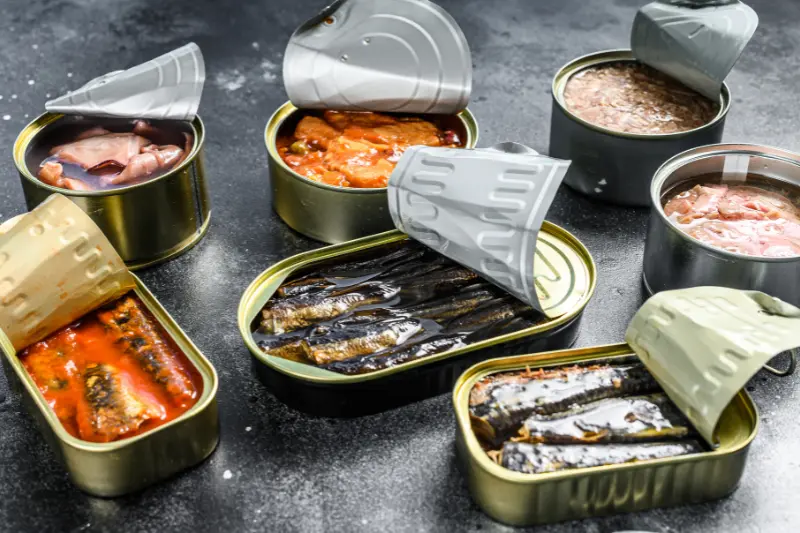Whether ready meals, baked goods, or sweets, processed or highly processed foods are popular. They often contain a lot of fat, sugar, salt, additives, and an overall rather unfavorable nutrient profile. Here you will find out everything you need to know about processed foods and what you need to consider when shopping.
What are processed foods?
Processed foods are products that have been processed by various methods, such as cooking, baking, fermenting, or preserving. Depending on the degree of processing, processed foods can be divided into different categories. Here is a list of examples of processed foods:
Processed foods: examples
Unprocessed and minimally processed foods
Products that have little to no processing include various plant and animal foods. These should make up the base of the diet. Minimal processing methods such as drying, roasting, cutting, freezing, or heating are used for this purpose. These foods include the following products:
- Fresh fruits and vegetables
- Nuts and seeds
- oatmeal
- rice
- Eggs
- milk
- Fresh meat and fish
- coffee and tea
Processed ingredients
Processed ingredients include products that have undergone further steps of industrial processing, such as pressing, refining, grinding, or crushing. For food preparation, these products are used in small quantities. The following examples belong to this category:
- Vegetable oils
- Butter
- Sugar and syrup
- Vinegar
- Salt
Processed foods
This group includes food that has been treated by preservation methods such as cooking, smoking, curing, or fermenting. In this list, you will find examples of processed foods:
- Bread
- Cheese
- Canned fruits and vegetables
- Canned fish
- Jam
Highly processed food
Highly processed foods often contain significantly more ingredients and can be consumed directly or after heating. They often contain various additives. These ultra-processed foods should only be consumed in small amounts:
- Baked goods and snacks
- Sweets
- Cereals
- Meat and sausage products with additives
- Soft drinks
- Frozen pizza
- Ready meals
- Instant soups
REMINDER.
Processed foods can be divided into different categories depending on the amount of processing they have undergone.
Are highly processed foods unhealthy?
Heavily processed foods often have a low nutrient density but provide plenty of calories. They are usually high in fat, carbohydrates, salt, and sugar, and the products provide little satiating fiber or protein. Because of their rather poor nutrient profile, processed foods can increase caloric intake and, in combination with little exercise, promote overweight and obesity.
In addition, highly processed foods contain a number of additives, such as flavorings, colorings, and preservatives. The majority of these substances are considered safe. Others, such as sodium nitrite (E250) from cured sausages, can form carcinogenic substances in the body. Frequent consumption of processed meat products is discouraged because consumption is associated with an increased risk of colorectal cancer.
REMINDER
Highly processed foods often have an unfavorable nutrient profile because they are often high in fat, sugar, salt, and additives.
Do processed foods make you fat?
Instant meals, frozen pizza, and convenience foods are cheap and readily available. At the same time, they are considered fattening because not only do they provide a lot of calories, but they can also stimulate appetite. Low protein and fiber content can contribute to eating more because protein and fiber are valuable fillers.
The intense taste of processed foods such as sweets or fatty and salty foods can also tempt people to continue eating. Increased energy intake can thus promote weight gain in the long term. When enjoyed in moderation, processed foods, especially the marginally processed ones, can be well integrated into a balanced diet.
REMINDER
Heavily processed foods do not make you fat per se, however, they can promote weight gain due to their caloric content.
Consciously consume processed foods
Unprocessed foods such as fresh vegetables, fruits, and legumes should always make up the base of a diet. Grains and nuts are also components of the recommended diet. These mainly plant-based foods can be supplemented with animal products such as fish, eggs, milk, or some meat.
For processed products, it is worth taking a closer look at the label. Not only the nutritional value table but also the list of ingredients provide information about the composition and degree of processing of the product. Particularly recommended products include, for example, frozen vegetables, canned tomatoes, or pre-cooked pulses. For quick and healthy cooking, these processed foods are valuable ingredients.
A diet that is completely free of processed foods is also known as clean eating. The idea is to consume products that are as unprocessed and sustainable as possible.
